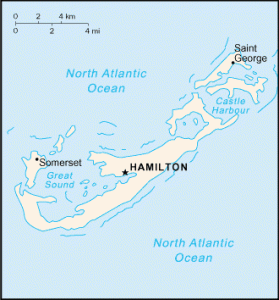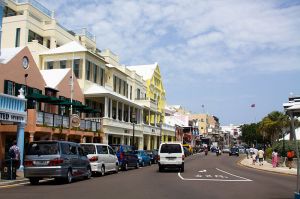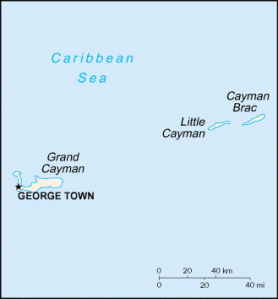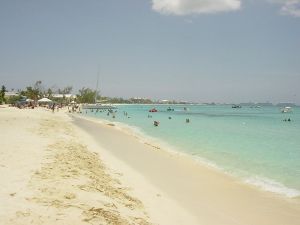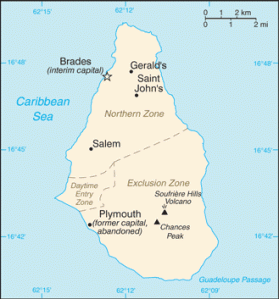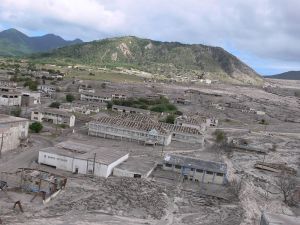The Caribbean is where Britain’s imperial legacy is arguably at its greatest. Although it is an area where Britain’s influence has decreased greatly since the heyday of the British Empire, as colonies declared their independence, the UK still retains control over numerous territories. Alongside other nations, such as the USA, France and the Netherlands the UK still retains a colonial presence in the region and these colonial legacies have created distinct identities in the contemporary society of these territories. These Caribbean territories are the largest British Overseas Territories in terms of population and, due to their geographic position, are amongst the most productive and prosperous of all Britain’s remaining territories.
Britain’s oversea’s territories in the Caribbean include:
- Anguilla
- Bermuda
- British Virgin Islands
- Cayman Islands
- Montserrat
- Turks and Caicos Islands
Bermuda
Populations:
- 64,268 (Roughly half way between the populations of Durham and Bath, both England)
Although not technically in the Caribbean Bermuda has always been considered an extension of British lands in the Caribbean and North America. Once America became independent politically Bermuda was always associated with the Caribbean.
Bermuda is not only the largest British territory in terms of population, but it is also the oldest, having been under British rule since 1609. The Virginia Company, who colonised the east coast of America, were the first to establish a settlement on the island. Ever since then Bermuda has grown in population and been seen, due to its location in the North Atlantic, as a strategic gateway to both North America and the Caribbean.
Soon after the establishment of settlements in the island the economy shifted towards a focus on maritime businesses, including whaling, merchant trade and privateering. However even with its strategic position Bermuda was largely left to govern itself. It built up great political influence in the Atlantic salt industry, the lumber trade, cod fishing and merchant trading in the ports of the American Atlantic Seaboard and the West Indies. This influence and autonomy meant that Bermudian culture on the 18th century was far more in line with America, and when the War of Independence started, Bermuda was initially supportive of the Americans. This forced Britain and the Royal Navy to increase their presence in the island, changing to focus of life and the economy again, this time focusing on defence.
Today Bermuda enjoys some of the highest standards of living of any territory in the world and its economy has boomed, following its new position as an offshore financial centre. Although this had caused much controversy in international politics the strong economy of Bermuda has prompted its inclusion into the Caribbean political/economic organisation, CARICOM and encouraged close relations with the USA, both politically and economically.
Bermuda is undeniably a jewel in Britain’s Overseas Territories; a territory that is economically strong and politically important. Its unique global position has given it unparalleled power in the North Atlantic and its intricate history has meant that far from being an isolated and forgotten territory, Bermuda has remained a regional player and the gateway to the Caribbean.
Cayman Islands
Population:
- 54,878 (Nearly equal to the population of Hereford, England)
The Cayman Islands do not hold the same historic or symbolic importance of the other British territories. Instead they are renowned for their role in the global economy as centres for international finance. Having been incorporated into the British Empire, following the Treaty of Madrid in 1670 the territory grew slowly, but historically has always retained its status of tax-exemption and has never levied income tax, capital gains tax or any other wealth tax.
When the contemporary territory of the Cayman Islands is examined its is clear that its dominated by finance. There are more registered businesses in the islands than there are people and out of the people who live on the islands, many are ex-pats who seek to benefit from the preferential tax system.
However despite the dominance of the financial services that characterise the international view of the Cayman Islands, there is far more to Cayman culture. Located just south of Jamaica it lies in the heart of the Caribbean and therefore shares much of the tropical landscapes and vibrant culture that characterises its regional neighbours. Its sandy beaches, shipwrecks, snorkelling and trails through the landscape of Grand Cayman all provide great draws for tourists all over the world.
The business environment has made the Caymans famous, creating a truly cosmopolitan and varied territory where, with a growing population, more and more people are seeing and experiencing the sport, music and lifestyle that is an inherent part of the modern territory. Although much of the Britishness of Cayman culture has been replaced by a more generic western perspective on society, looking deeper into life in the islands shows observers that there is more to the Cayman islands than their tax free status.
Montserrat
Population:
- 5,164 (Roughly one hundredth of the population of Manchester, England)
Montserrat is by far the smallest of all Britain’s colonies in the Caribbean but is definitely one of the more fascinating. Despite becoming an English colony in 1632 it was the influence of the Irish that most heavily influenced early society in the territory, and even today St Patrick’s day is celebrated as a public holiday, the only place outside of Ireland to do so. Irish people, alongside many Africans, were taken as slaves to work on the island in sugar plantations and it was not until the Sturge family bought land in the island and established the Montserrat Company Ltd, that English culture came to dominate.
Often administered from other islands in the Caribbean Montserrat became known as a retreat and because of music studios established there, musicians from round the world came to visit the island. However the peace of the island was shattered by two natural disasters that have devastated the island, which has never fully recovered.
Firstly on September 17, 1989 Hurricane Hugo, a Category 4 storm, struck Montserrat and damaged over 90 percent of the structures on the island. The tourist industry along with much of the merchant trade collapsed and the economy of the island was severely crippled. Within a few years, the island had recovered considerably, but the hurricane had left a legacy in the island.
Next to come was a natural disaster that fundamentally changed life in Montserrat. In July 1995 the Soufrière Hills volcano began to erupt, having been considered dormant. The eruption that occurred buried most of the island, including the capital Plymouth, which was under 12m (39ft) of mud. The airport and docks were destroyed and the lower half of the island was separated as an exclusion zone. To this day the area is still an exclusion zone with Montserrat forced to build a new airport, construct a new capital and try and rebuild the society and economy of the territory in the Northern half of the island.
The eruption caused many people to leave Montserrat as the economic conditions were so difficult and with the volcano continuing to erupt resuming life in the Southern part of the island looks increasingly unlikely. As a result Montserrat is reliant largely on aid from the British government to keep the economy going, but this has signified the relationship Britain has with even its smallest territories and the shared cultural, political and social traditions that territories like Montserrat have with the home nation of Great Britain.
The British territories of the Caribbean, unlike any other world region, have seen more dramatic shifts in ownership, politics and economics. Despite being small they are often economic powerhouses driving their own development forward. However the Caribbean is a region of contrasts. The British territories here include some of the richest regions of the world, whilst also included those devastated by natural disasters and economic troubles. It is the region with the greatest history and the most vibrant culture and one, at the moment, content in its relationship with Britain.


